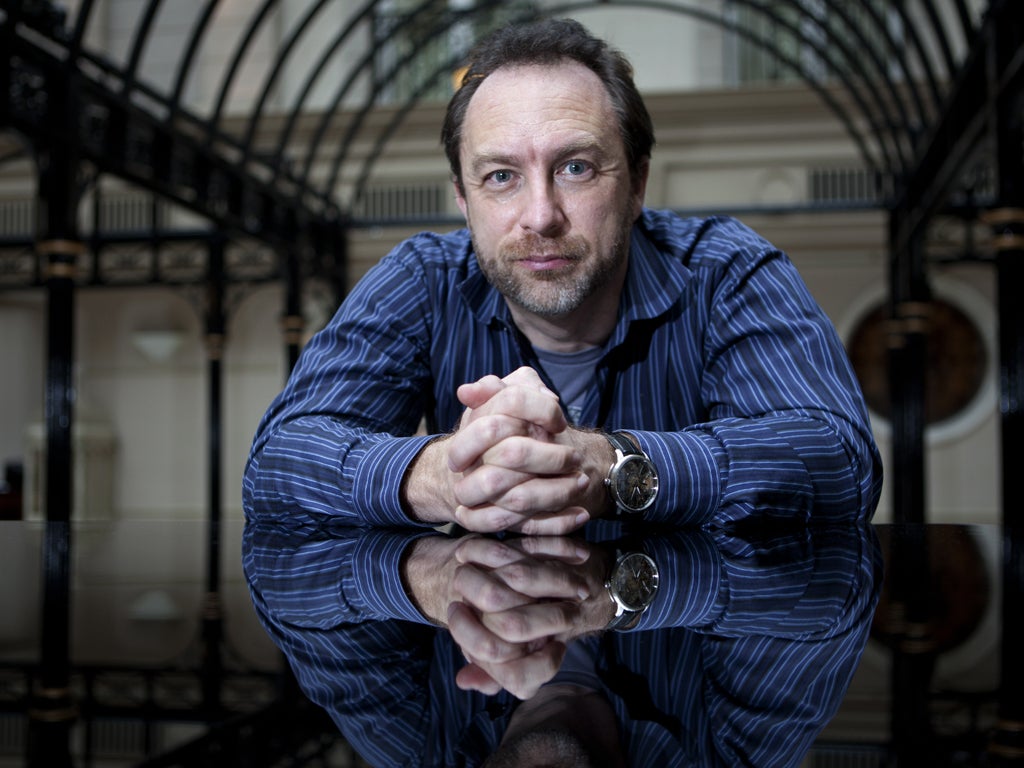Why I want to bring down the internet – for a day
Jimmy Wales, the Wikipedia founder, hopes sites from Google to Twitter will join his protest against a legal crackdown

Your support helps us to tell the story
From reproductive rights to climate change to Big Tech, The Independent is on the ground when the story is developing. Whether it's investigating the financials of Elon Musk's pro-Trump PAC or producing our latest documentary, 'The A Word', which shines a light on the American women fighting for reproductive rights, we know how important it is to parse out the facts from the messaging.
At such a critical moment in US history, we need reporters on the ground. Your donation allows us to keep sending journalists to speak to both sides of the story.
The Independent is trusted by Americans across the entire political spectrum. And unlike many other quality news outlets, we choose not to lock Americans out of our reporting and analysis with paywalls. We believe quality journalism should be available to everyone, paid for by those who can afford it.
Your support makes all the difference.The founder of Wikipedia is leading calls for search engines and social media sites including Google, Facebook and Twitter to take themselves offline for an entire day in protest against a controversial bill winding its way through the US Senate that could have profound implications for the internet.
Jimmy Wales has called for a "public uprising" against the Stop Online Piracy Act (Sopa), which critics say will have a "chilling effect on innovation" by forcing websites to keep a much closer tab on what is posted by users on their pages.
Last night the Wikipedia founder confirmed that all English-language sections of his website would be taken offline for 24 hours starting tomorrow.
Although the legislation is American, it is likely to have a deep impact on websites around the world because so many of the largest search engines and social networking sites are based in the US.
The bill is the product of years of lobbying by music labels and film studios, which are infuriated that so much pirated content is still available through search engines and websites. They have lobbied Congress and the Senate to introduce Sopa, which in its current form will transfer the onus of responsibility for policing the internet from law enforcement agencies to websites and the internet providers themselves.
That has caused serious concerns among the founders of leading search engines and websites such as Google, Facebook, Twitter and Wikipedia, who have written a joint letter to Capitol Hill urging a rethink of the current legislation. Fearing that the Senate will push the bill through unamended, Mr Wales is now pushing for the world's most popular websites to initiate a "day of darkness" and shut down simultaneously in an attempt to galvanise opposition to the bill.
The idea was first mooted by Reddit, a popular social media website where users aggregate and rate links to other sites. Writing on his own blog, Mr Wales asked followers to decide whether Wikipedia should do the same and initiate a "public uprising" against Sopa.
"Right now what I'm thinking is that if there is a credible threat that this might happen, this could have a positive impact on the thinking of some legislators," he said. "Do not underestimate our power – in my opinion they are terrified of a public uprising about this, and we are uniquely positioned to start that."
The vast majority of responses to the blog post were in favour of a one-day strike that would target all English-language sections of Wikipedia, which would mean the website would be temporarily unavailable in Britain.
Facebook, Twitter and Google, which have all publicly stated their opposition to Sopa, have yet to declare whether they will join Wikipedia. But many users are already planning to flood social networking sites tomorrow with information and links about Sopa and why it could be harmful for freedom of expression.
The growing movement of discontent appears to have rattled the White House, which has issued a statement suggesting President Barack Obama would be reluctant to sign the bill in its current form.
"We will not support legislation that reduces freedom of expression, increases cybersecurity risk, or undermines the dynamic, innovative global internet," the White House said, adding that online piracy needed a "serious legislative response" but one that must not "inhibit innovation".
What happens next is likely to depend on the efforts of competing lobbyists and whether enough steam can build up behind the online protest movement. Mr Wales is intending to meet senior politicians over the coming days to press for a more flexible piece of legislation but the media conglomerates that want to see a hard line from Capitol Hill are determined not to see their lobbying work stumble at the final hurdle.
It is not the first time Mr Wales has used the popular encyclopaedia he founded to make a political point. When legislation was put before the Italian parliament last year that would have forced websites to automatically delete any content that was flagged up as defamatory, Wikipedia hit back. For three days in October, visitors who accessed the Italian version of the site were only able to read a critique of the new legislation, which was quickly shelved after a growing public outcry.
Join our commenting forum
Join thought-provoking conversations, follow other Independent readers and see their replies
Comments